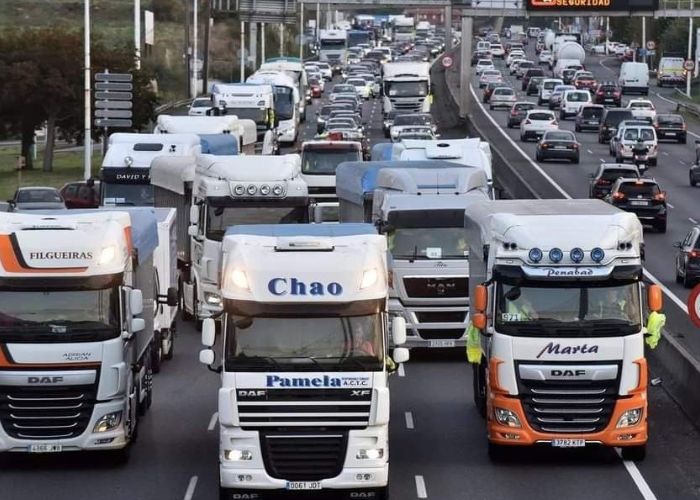MADRID – Monday, November 14, the indefinite strike of road transport in Spain will begin. Although it is not supported by the major industry associations, there are fears of daily losses of up to €600 million.
A similar strike by the road transport sector in March succeeded in paralysing the distribution of goods. This strike also did not have a majority. However, it led to shortages of products on the markets and eventually also in the supermarkets.
Related post: New transport strike in Spain
This indefinite strike comes just as the pre-Christmas period begins. This is a major concern for traders. Up to 300,000 trucks can stop working just before Black Friday and Christmas. According to an investigation by OBS Business School, the losses for each day of the strike would amount to €600 million. It is a major setback for the economy because the sector (transporters, self-employed workers and shippers) generates 25% of all their annual turnover at this time of year.
Little support from the sector
The Platform for the Defense of Road Transport has called for the strike but is not supported by the National Road Transport Commission (CNTC), 11 organisations and 70,000 companies. The shared motivation for not supporting the strike is that the measures taken by the government to help the sector are having an effect. However, the initiator of the protests, which started in March, believes that the law prohibiting carriers from operating at a loss, which the government approved in August, is not being complied with.
Working with loss
Antonio Cacicedo has been in the truck for 30 years. He ‘eats, works and sleeps’ there for 16 to 17 hours a day. This time he is not participating in the strike, but that does not make his situation any less dire. He regularly works at a loss. This is despite the measures taken by the government earlier this year in response to increased fuel costs and inflation. His fuel costs are still too high, even with the government’s 20-cent subsidy. If they previously used €5,000 worth of diesel for a truck, that is now, according to Antonio’s calculations, €3,500 more. It is twice as much as a year ago, say the truckers who stop at the gas stations.
Nicolás, 47 years and 25 in the truck, calculates. “For freight from Seville to Logroño, 860 kilometres away, they pay €500. Furthermore, the truck I have consumes 36 litres per 100 kilometres. Therefore, the journey does not even cover the fuel,” he adds. He therefore no longer loads the truck if he is not paid to at least cover the costs.
Moreover, fuel is not the only thing that has to be paid for. All basic services during travel have become more expensive. I used to eat in restaurants and sleep in the hotel, but now I can’t and do it in the truck.
Fear of supply of raw materials
Spain’s Grain and Oilseed Industry Association (ACCOE) warned that the shutdowns could jeopardize the supply of feed raw materials to farms. This would further worsen the situation in the grain sector and oil production – already hit by high inflation.
Shortages in supermarkets
In line with this, the agricultural associations COAG and UPTA are also demanding measures to prevent the strikes from affecting the food chain, as happened in March. At that time, the transport sector was paralysed, causing millions of euros in losses and shortages of basic commodities in supermarkets, such as milk, chicken or yoghurt and other highly demanded products such as beer.
Other sectors are also resisting these strikes. Whether the strike will affect general distribution in the country ultimately depends on the number of trucks that stop driving after midnight on Sunday.
The Platform Defense of the Freight Transport Sector unites the self-employed and small entrepreneurs and forms a minority within the sector.


